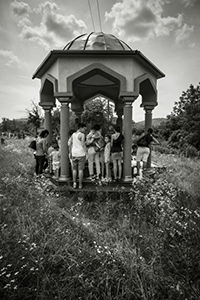
I don’t hate/Ja ne mrzim. Zijo’s story
photography exhibition by Andrea Rizza Goldstein, curated by Ziyah Gafić
a cura di Ziyah Gafić
| - |
|---|
The photography exhibition I do not hate/Ja ne mrzim opens with the public inauguration on Friday, 8th April at 5:30 pm until Sunday, 1st May at Spazi Bomben. Zijo’s story by Andrea Rizza Goldstein.
Organised by Fondazione Benetton Studi Ricerche with the cooperation of Fondazione Alexander Langer Stiftung, the exhibition/reportage stems from a study and fraternal friendship that began in 2011, at the International Week of Memory, organised in Bosnia Herzegovina by the very Fondazione Langer.
Zijo Ribić miraculously survived the massacre of his family and all the residents of Skocić, a small village in eastern Bosnia, in July 1992. He is the first Romani to take the issue of the genocide of his people during the war in Bosnia Herzegovina to court.
The reportage is a long-term project, which tells Zijo’s story through thirty black and white pictures, taken between 2013 and 2016. “His battle for truth and justice, his attention to assign accountability precisely without generalising and above all, his choice to forgive, have opened new perspectives in the difficult attempt at dialogue and facing the past,” says Andrea Rizza Goldstein. “His story and his message have built bridges and have had the concrete power, based on the tragedy he experienced, to prove that it is possible not to hate”.
The exhibition is inaugurated with a public meeting, with Zijo Ribić and Andrea Rizza Goldstein (Fondazione Alexander Langer Stiftung, Bozen), as well as with journalist Alberto Bobbio and sociologist Nataša Kandić (Humanitarian Law Center, Belgrade). “I don’t hate/Ja ne mrzim are the three words by Zijo Ribić which we most hold dear” says Patrizia Boschiero, who follows this work at Fondazione Benetton, “which surprise us and challenge us each time, and strengthen the drive to tell his story, to support him in giving a voice to his battle for truth and for justice, and for the dignity of the human being”.
Organised within the cultural campaign of the 2014 International Carlo Scarpa Garden Prize awarded to the villages of Osmače and Brežani, Srebrenica, Bosnia Herzegovina, the exhibition is dedicated to Ismet, Ševka, Zlatija, Zijada, Suvada, Almasa, Ismeta, Zlata and Sabrija, Zijo’s parents, sisters and brother. It also features a notebook with a selection of the photographs and some texts which, along with his story, deal with the context of the war in former Yugoslavia in the nineties and the issue of “ethnic cleansing” and slow motion genocide. Authors include Irfanka Pašagic (Tuzlanska Amica/ International Alexander Langer Prize 2005), Nataša Kandic (Humanitarian Law Center of Belgrade/Langer Prize 2000), Valentina Gagic (Adopt Srebrenica), Bekir Halilovic (Adopt Srebrenica).
